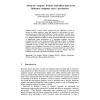Free Online Productivity Tools
i2Speak
i2Symbol
i2OCR
iTex2Img
iWeb2Print
iWeb2Shot
i2Type
iPdf2Split
iPdf2Merge
i2Bopomofo
i2Arabic
i2Style
i2Image
i2PDF
iLatex2Rtf
Sci2ools
ACII
2007
Springer
2007
Springer
Stoop to Conquer: Posture and Affect Interact to Influence Computer Users' Persistence
RoCo, a novel robotic computer, has the capability to move its monitor in subtly expressive ways that respond to and promote its user’s postural movement. Motivated by Riskind’s “Stoop to conquer” research where it was found that postures congruous to the type of outcome a person received (e.g. slumping following a failure or sitting up proudly following a success) led to significantly better performance in a subsequent cognitive task than incongruous postures (e.g. sitting up proudly following a failure or slumping following success), we performed two experiments where RoCo was used to manipulate its user’s posture. Our results show that people tend to be more persistent on a subsequent task when RoCo’s posture is congruous to their affective state than when it is incongruous. Our study is the first to show that a computer’s “pose” congruous or incongruous to a user’s affective state can influence factors such as persistence in problem solving tasks.
ACII 2007 | Applied Computing | Incongruous Postures | Subsequent Cognitive Task | User’s Postural Movement |
| Added | 06 Jun 2010 |
| Updated | 06 Jun 2010 |
| Type | Conference |
| Year | 2007 |
| Where | ACII |
| Authors | Hyungil Ahn, Alea Teeters, Andrew Wang, Cynthia Breazeal, Rosalind W. Picard |
Comments (0)

